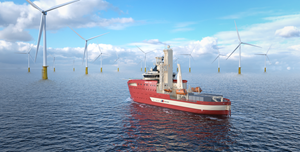News
Bureau Veritas joins NavHyS project to advance liquid H2 innovation in shipping
Bureau Veritas Marine & Offshore (BV) announced its participation in NavHyS, a new European research project dedicated to advancing the use of liquid H2 (LH₂) in maritime applications. Funded by the Clean Hydrogen Partnership, NavHyS brings together a consortium of 14 partners from across Europe, with the shared goal of decarbonizing the shipping industry.
Working closely with ArianeGroup, BV has played a key role in developing the project proposal and consortium structure and contributed its expertise in safety, rule development, and classification to support innovation in H2-fuelled vessels. In particular, NavHyS focuses on one of the most technically ambitious aspects of H2 deployment at sea: the use of below-deck Type C LH₂ tanks as marine fuel for service operation vessels (SOVs).
As part of this effort, BV will deliver three Approvals in Principle (AiPs) through its Design Assessment activities, covering the liquid H2 storage system, fuel system, and their integration into an SOV. In addition to classification and AiPs, BV will further lead safety research and rule development specific to liquid H2 in maritime environments. The project will also examine shore-based H2 supply solutions and the lifecycle of H2-fuelled vessels.
NavHyS officially launched in January 2025, and will run for 36 months, with an EU contribution of €5 million. The project is expected to reach Technology Readiness Level (TRL) 8-9 by 2030, enabling scalable, real-world deployment by 2035-2040.
By combining maritime design with the space sector’s experience in cryogenic storage, NavHyS aims to deliver a breakthrough concept for SOVs supporting offshore wind farms. The design envisions storage tanks of 200-300 m³, capable of carrying 12-18 tons of liquid H2, bunkered at 10-ton H2/hour, and providing up to 10 days of autonomous operation.
NavHyS is coordinated by ArianeGroup, bringing together leading organizations and LH₂ experts including ENGIE, Gas and Heat, INERIS, RISE (Swedish Research Institute), and Vard.
Matthieu de Tugny, President of Bureau Veritas Marine & Offshore, said, “BV is proud to support the NavHyS project and contribute to overcoming the technical and safety challenges linked to liquid H2 deployment in shipping. Our involvement in this innovative consortium reflects our commitment to supporting advanced technologies that accelerate maritime decarbonization, helping to shape a safe, scalable future for H2-powered vessels.”
Nicolas Hardouin, Program Manager at ArianeGroup, said, “The design of the liquid H2 fuel system, relying on our heritage of space system architectures and technologies, and its below-deck integration in the ship, represent a disruptive innovation in comparison with previous maritime projects and design guidelines.”


